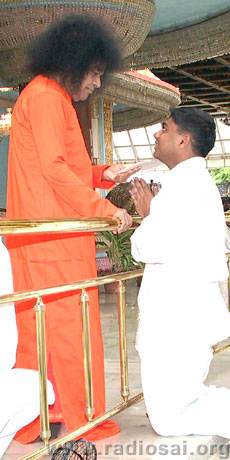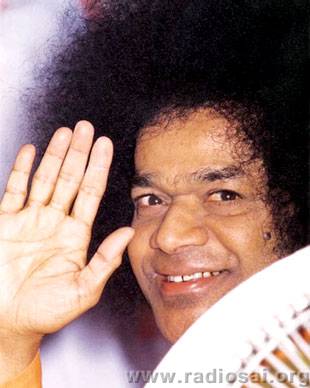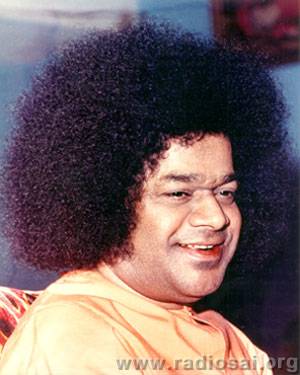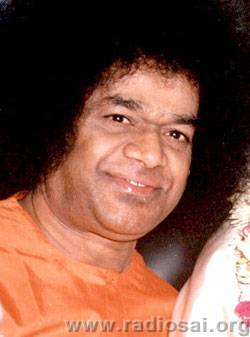 |
 |
 |
 |
| Volume
3 - Issue 10 OCTOBER 2005 |
|
| CONVERSATIONS WITH SAI PART 13 (Continued from the previous issue) |
| Click here to go to Previous issue story > > |
Hislop: Is not praying to God the same as begging? Hislop: But I had thought that since God knows each problem, that if it was appropriate to remedy the trouble God would do so without being asked. SAI: Important answer! No. It is your duty to ask God. Words must be spoken, and the words must correspond to the thought. The thought must be put into sincere speech. It is correct that Divinity is Omniscient. But He requires that sincere words be spoken. The mother may know the child requires food to maintain life, b ut milk is given when the child asks for it. Hislop: It is not clear when one should ask God and when one should not. For example, there is a headache that doctors seem unable to cure. I do not ask Swami to cure the headache; I do not pray for a cure. However, in a letter, Swami wrote; 'How is your health? Do not worry about that. Your God is always with you, in you, around you'. SAI: That is right. What Baba said is enough. For you, body identification is weakening. You have a headache today, a stomach pain tomorrow. Let it go. Don't worry about it. You are not the body. Once Baba has told you not to worry, there is no need to ask Him about it. Don't identify. Hislop: Does Swami mean that for those persons still fully identified with the body, a continuous headache might be a proper subject for prayer? SAI: Yes, but why bother Swami about a mere headache. You may tell others the same. Hislop: Then, is it really all right to ask God? SAI: God should be asked for help when there is a real need . A child asks his parents for a peppermint sweet, and the parents oblige. When older, the child asks for property from the parents, and it receives this. It is by right that the child asks, and it is by right that it receives. A child may ask a stranger for a peppermint once or twice and expect to get one. But if he asks for property from a stranger he will not expect to receive anything. But God is not bothered by a multitude of small requests, and He will certainly give property (things of great value). Therefore, one should always ask God to meet one’s needs. It is the individual's right to ask. There is no question of begging.
SAI: It is not necessary to put oneself into any particular st ate of meditation. Hislop: Usually, the idea is that one should go to a quiet place and be in a quiet mood when one wishes to pray. SAI: Whenever and wherever you put yourself in touch with God that is the state of meditation. You may feel that 1 p.m. in California is not a good time to call Me, for I may be asleep in India and that I should not be disturbed. I know you have felt like that once or twice. But, I am omnipresent; I have no such limitations. I never sleep. At the middle of the night, I turn off the light and rest in bed, because if the light is on, devotees will gather. I have no need of sleep. But you need at least 4 hours of sleep. Hislop: If I am walking in the street, with people around, and my mind is engaged with things I must do, is that a good time for prayer? SAI: At the beginning, one might need some special set of circumstances for clearing the mind for concentration on God. But in a little time, if one finds that God is omnipresent and becomes aware of Him, and one's thoughts are centered on God, then no matter where you are, it is the same. The prayers may be addressed to God and will reach Him. Hislop: Swami says that God is omnipresent. What meaning does Swami give to the word, 'omnipresent'? SAI: Omnipresent means everywhere at the same time, all the time. On Peace of Mind: Hislop: If a person does not have any material or worldly needs, then what is the proper subject for prayer? SAI: Peace of mind. One should pray to God for peace of mind. SAI: How can you be free of desires? At this moment you are with Swami, and you are free of desires. As soon as your wife has a pain, you have the desire that she should be well, and you pray to Swami to cure her. At any time, a desire may come up; and then where is your peace of mind? Whereas, if God answers your prayer for peace of mind, He must, by having granted that boon, automatically fulfil your needs and desires. First you want a chain from Baba, next day you want something else - a ring. Both are made of gold. Why not ask for gold and then you can have everything you want from the gold. Hislop: When Swami says, 'peace of mind,' what is the meaning He gives to that phrase? SAI: There is some small confusion in terms, for there is no mind as such. Mind is a web of desires. Peace of mind is ' no desire’, and in that state there is no mind. Mind is destroyed, so to speak. Peace of mind really means purity, complete purity of consciousness. All spiritual practices are aimed at purification of the heart. On Swami's Visit to America: Hislop: Swami, please excuse this question, but it is in everyone's mind. Will Swami come to America soon? SAI: Baba will delay until a further base is built in America . However, I can go informally anytime. The devotee need only call me and I will appear at once. Swami has his work to renew India . This must be finished before he is willing to do the same in a foreign country. People generally go to a foreign country with a desire of some sort. Baba has no desire. Of course foreign individuals come to Baba. On 'The Most Subtle Aspect of Swami's Teaching': Hislop: What is the most subtle point of Swami's teaching, and then in the circle around that point, what are the things to do in order to realize that most subtle aspect of His teachings? In dealing with people, Swami looks to the good and ignores the bad so as to intensify the good. Swami's teaching is, in a way, just as when you go to buy sugar in a shop, you do not bother about all the other details of the shop; the history and character of the shopkeeper, his personal relationship with other people, his personal looks, whether he is tall or short, old or young, and so on. The central part of Swami's teaching in regard to living in the world is to see in other people that essential quality which is God and to love that quality and not to be bothered by all the actions, qualities, misbehaviour, and characteristics of the person. And the love of God in the person with whom one is dealing is spiritual love and not physical love. That does not mean, in terms of the worldly nature of the being in whom one sees the Lord, that one condones or admires, or does not scold the misbehaviour of the worldly part of that person. Even though one sees and loves and really pays attention to God in that person, nevertheless, that person should be scolded, and his attention called to his failures and shortcomings and so on. That is not being cruel. The factor here is the intention. Just as in a street fight amongst labourers, one man might scratch the hand of another man with a penknife and cause no wound at all - yet the police will come and take him away to jail. Whereas in a nearby hospital, a surgeon might take a sharp knife and cut a five-inch gap in a man's body in order to remove the appendix, his action being highly rewarded. So in one case the doctor is severely wounding a person and getting praise; and in the other case, a labourer merely scratches someone and ends up in jail. The important issue is the intention of the person. Sometimes Swami finds it advisable to operate on someone that is to wound him, to say something that may hurt him, or to reveal his bad points instead of just looking at the good points. But when Swami does that, the intention behind it is that of helping, and not of hurting or harming the patient. (Swami then turned to Hislop and said) Hislop: One finds himself so faulty that there seems to be no possibility of being of any help to others. SAI: People often think they have to be perfect themselves before they can help anyone else, but such is not the case. If one has a fault or certain weakness, one can point out to others that same weakness that is in oneself. And if someone replies, 'Before you tell me how to behave, why don't you behave correctly?' Then one could say that he knows the pain of behaving in this way and he hopes that the other person could avoid the same trouble that he experienced. In that way, not only is the difficulty in oneself helped to be overcome, but others will be helped as well. For example, suppose a man walks along a road covered with thorns which cut his feet with great pain. Having crossed the thorns he sits down to rest, and then sees other people approaching the thorny area. Now, should he beckon them to come across the thorns and endure the same suffering that he had endured? Surely, that would not be a good deed. Or, should he call to them and warn them that the thorns are there and that they should try to find some other way of getting across and reaching their destination? If a person has the humility to recognise a fault in himself and admit that fault, then others will be helped thereby and also oneself. To pretend that one is perfect, to tell people how to behave, pretending that oneself behaves in a perfect fashion and that one is perfect, is a great sin. Not because it harms other people, but because it seriously harms oneself. (To Be Continued).... |
| You can write to us at h2h@radiosai.org |
Vol 3 Issue 10 - October 2005 |
Optimized for Netscape and Firefox. Best viewed in Internet Explorer - 1024 x 768 resolution. |
 SAI:
SAI:
 Hislop: I am surprised. I thought Swami said that peace of mind
has to be secured by oneself working on his desires and getting
rid of them. And now Swami says we can pray to Him for peace
of mind!
Hislop: I am surprised. I thought Swami said that peace of mind
has to be secured by oneself working on his desires and getting
rid of them. And now Swami says we can pray to Him for peace
of mind!  SAI:
SAI: It is perfectly all right to ask all these questions and clear all your doubts. You are examining Swami and Swami is giving the answers. But when this is all finished, the next time around, Swami will be the examiner and you will be examined. You will have to have the right answers in mind and heart. Now, all doubts should be emptied so that tomorrow
Swami can fill your being with something new, a new oil to
bathe the skin, so to speak.
It is perfectly all right to ask all these questions and clear all your doubts. You are examining Swami and Swami is giving the answers. But when this is all finished, the next time around, Swami will be the examiner and you will be examined. You will have to have the right answers in mind and heart. Now, all doubts should be emptied so that tomorrow
Swami can fill your being with something new, a new oil to
bathe the skin, so to speak.